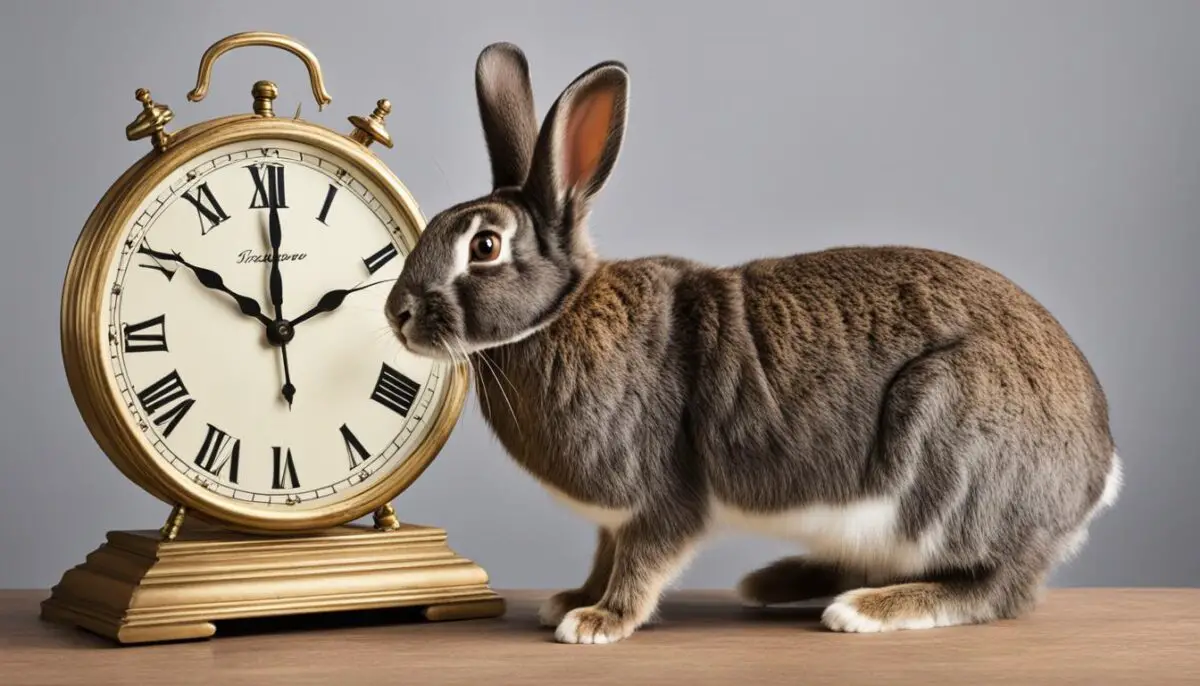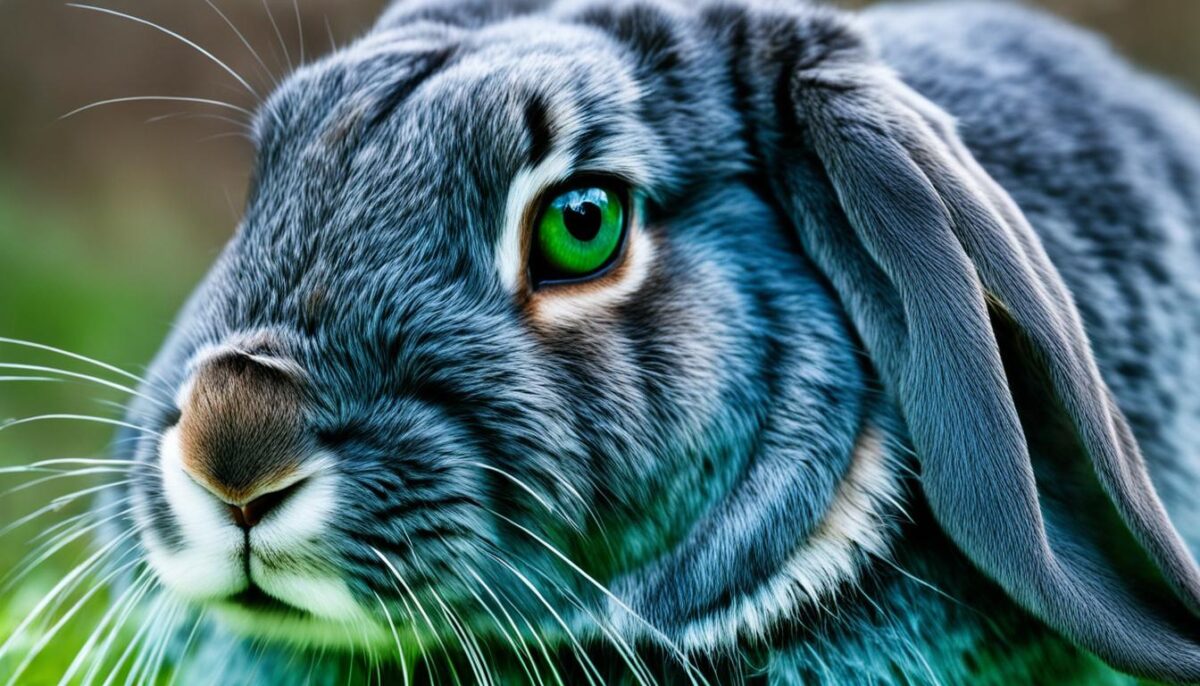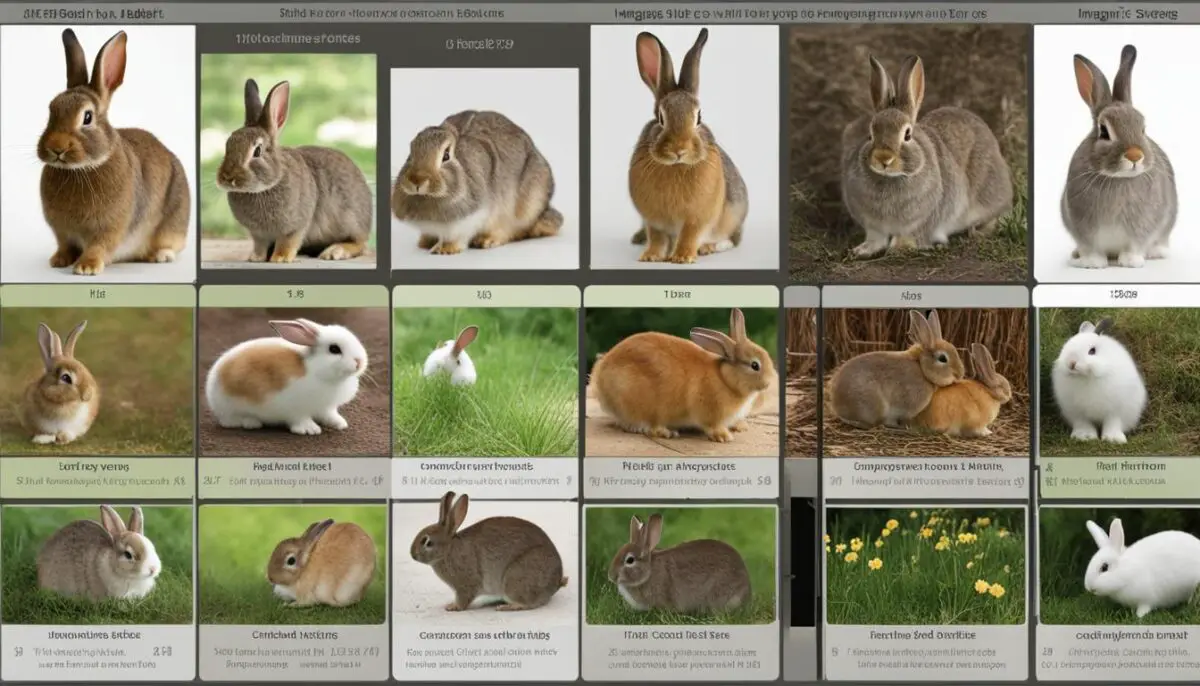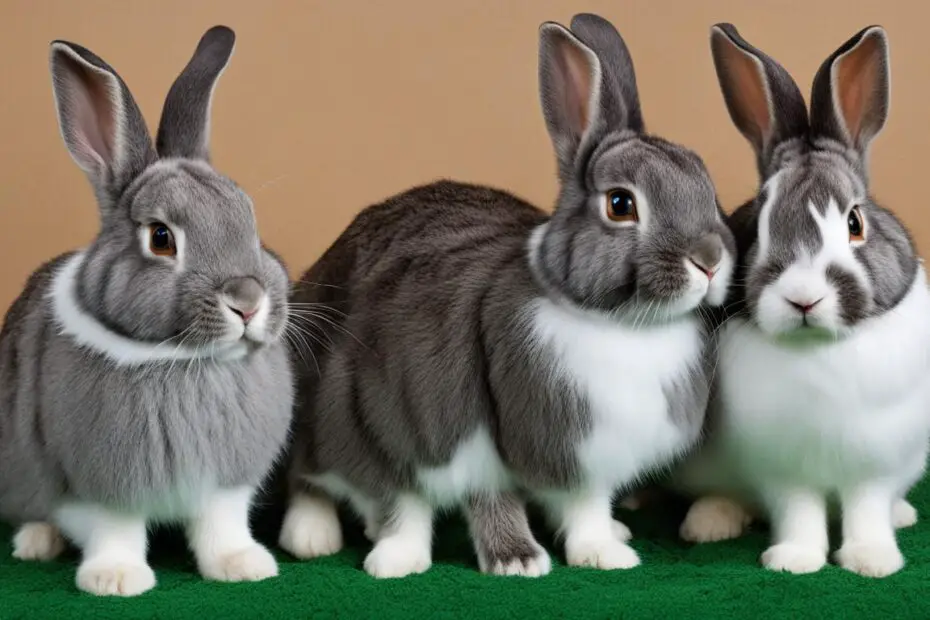Curious about how long domestic rabbits live? Understanding their lifespan can help you provide the best care for your furry friend. Domestic rabbits can thrive for an impressive 8-12 years with proper care, nutrition, and attention to their specific needs.
The lifespan of a domestic rabbit can be influenced by various factors, including breed, genetics, diet, and exercise. Larger breeds and purebred rabbits generally have shorter lifespans compared to dwarf breeds and mixed breeds.
To ensure a long and healthy life for your rabbit, it’s crucial to provide a balanced diet, including timothy hay, fresh greens, and high-fiber pellets. Regular exercise, both inside and outside the cage, plays a vital role in your rabbit’s physical and mental well-being.
Key Takeaways:
- The average lifespan of a domestic rabbit is 8-12 years.
- Larger breeds and purebred rabbits tend to have shorter lifespans than dwarf and mixed breeds.
- A balanced diet, including timothy hay, fresh greens, and high-fiber pellets, is essential for a rabbit’s longevity.
- Regular exercise, both inside and outside the cage, promotes a rabbit’s physical and mental well-being.
- Providing proper care, nutrition, and attention to your rabbit’s needs can help ensure a long, happy life.
Factors Affecting Rabbit Lifespan
The lifespan of a domestic rabbit can be influenced by several factors. One significant factor is the breed of the rabbit. Smaller breeds tend to have longer lifespans compared to larger breeds. This is because larger breeds may be more prone to certain health issues that can affect their lifespan.
Genetic predispositions and health conditions specific to certain rabbit breeds can also impact their lifespan. It is important to be aware of any breed-specific health concerns and take appropriate measures to address them. Regular veterinary check-ups, including spaying or neutering, are crucial for maintaining a rabbit’s health and increasing their lifespan.
Providing proper nutrition is vital for a rabbit’s longevity. A balanced diet consisting of specialized pellets, fresh hay, and a variety of vegetables ensures that rabbits receive the necessary nutrients for their well-being. Consulting with a veterinarian or an experienced rabbit care provider can help determine the appropriate diet for your rabbit’s specific needs.
It is worth noting that while proper care and attention can significantly extend a rabbit’s lifespan, each rabbit’s life expectancy can vary. Some rabbits may live longer than the average age, while others may have shorter lifespans. Regular observation, appropriate care, and a nurturing environment are essential for promoting the health and well-being of domestic rabbits.
| Factors | Description |
|---|---|
| Breed | The size and breed of the rabbit can influence its lifespan. Smaller breeds tend to have longer lifespans compared to larger breeds. |
| Genetic Predispositions | Some rabbit breeds may have genetic predispositions to certain health conditions that can affect their lifespan. |
| Health Conditions | Specific health conditions can impact a rabbit’s lifespan. Regular veterinary check-ups and addressing any health concerns are essential for their well-being. |
| Nutrition | A balanced diet with specialized pellets, hay, and vegetables can contribute to a rabbit’s longevity. |
| Veterinary Care | Regular veterinary check-ups, including spaying or neutering, are crucial for maintaining a rabbit’s health and increasing their lifespan. |

Common Rabbit Illnesses
Rabbits can sometimes experience health issues, even with the best care. It is important for rabbit owners to be aware of common rabbit illnesses and their symptoms in order to provide prompt veterinary care and increase the chances of a rabbit’s recovery. Here are some common health concerns that rabbit owners should watch out for:
- Overgrown teeth: Rabbits have continuously growing teeth, and if they do not wear down properly, they can become overgrown. This can lead to dental problems, pain, and difficulty eating. Regular dental check-ups and providing proper chewing materials can help prevent this issue.
- Snuffles: Snuffles is a bacterial infection that affects a rabbit’s respiratory system. It causes symptoms similar to a cold, such as sneezing, nasal discharge, and breathing difficulties. Prompt veterinary treatment is crucial to prevent the infection from worsening.
- Uterine tumors in female rabbits: Unspayed female rabbits have a higher risk of developing uterine tumors. These tumors can cause various health problems and affect the rabbit’s overall well-being. Spaying rabbits at a young age can help prevent this issue.
- Myxomatosis: Myxomatosis is a deadly disease that is spread through mosquito bites. It causes severe illness and can be fatal for rabbits. Preventing mosquito exposure and considering vaccination, if available, can help protect rabbits from this disease.
“Recognizing the signs of illness early and seeking prompt veterinary treatment is crucial for a rabbit’s recovery.”
To prevent and manage these health issues, rabbit owners should maintain a clean and hygienic living environment for their pets. Regular cleaning of the rabbit’s hutch, providing fresh bedding, and ensuring proper ventilation can help reduce the risk of infections. Spaying or neutering rabbits can also have long-term health benefits and reduce the risk of certain illnesses. In addition, routine veterinary check-ups are important to monitor a rabbit’s overall health and detect any potential health concerns.

| Common Rabbit Illnesses | Symptoms | Treatment |
|---|---|---|
| Overgrown teeth | Difficulty eating, drooling, weight loss | Trimming or filing the teeth, providing appropriate chewing materials |
| Snuffles | Sneezing, nasal discharge, breathing difficulties | Antibiotics, supportive care |
| Uterine tumors in female rabbits | Abdominal swelling, loss of appetite | Surgical removal of the tumors |
| Myxomatosis | Swelling around the eyes, lethargy, loss of appetite | Supportive care, vaccination if available |
Rabbit Developmental Stages
Understanding the developmental stages of rabbits can provide insight into their lifespan. Although rabbits age differently than humans, we can estimate their age in human years based on their developmental milestones. Here is a rough conversion of rabbit age to human age:
Birth to 1 week: Similar to a newborn human baby.
2 weeks: Comparable to a human infant at around 3 months old.
1 month: Similar to a human baby at around 6 months old.
3 months: Comparable to a human child at around 2 years old.
6 months: Similar to a human child at around 10 years old.
1 year: Comparable to a human adolescent at around 15 years old.
2 years: Similar to a human young adult at around 25 years old.
3-4 years: Comparable to a human adult in their early 30s.
5-6 years: Similar to a human adult in their late 30s to early 40s.
7-8 years: Comparable to a human adult in their 50s.
Please note that this conversion is a general estimate and may vary depending on the individual rabbit’s breed, genetics, and health. It is important to provide proper care, nutrition, and veterinary attention to ensure the well-being and longevity of your furry companion.

Maintaining a Rabbit’s Health and Happiness
To ensure the health and happiness of your rabbit, it is essential to provide a safe and enriched environment. By prioritizing rabbit care, you can create a lifestyle that promotes their overall well-being. Let’s explore some key aspects of maintaining a rabbit’s health and happiness:
Proper Hygiene
Keeping your rabbit’s living space clean is crucial for their health. Regularly cleaning their hutch and removing soiled bedding helps prevent the buildup of bacteria and reduces the risk of infections. Maintaining proper hygiene not only promotes a safe environment but also contributes to your rabbit’s overall happiness.
Spaying or Neutering
Spaying or neutering your rabbit is highly recommended to prevent reproductive health issues. This procedure not only helps control the rabbit population but also eliminates the risk of certain hormonal diseases, such as uterine tumors or testicular cancer. Consult with a veterinarian experienced in rabbit care to discuss the best time for spaying or neutering.
Experienced Veterinary Care
Rabbits have specific health needs, and finding a veterinarian experienced in rabbit care is essential. Regular check-ups with a knowledgeable vet can detect any health issues early on and initiate appropriate treatment. Establishing a good relationship with your vet will ensure that your rabbit receives the best care possible.
Proper Nutrition
Providing a balanced diet is vital for your rabbit’s overall health and well-being. Ensure they have access to fresh hay, which is essential for their dental health and digestive system. Supplement their diet with a variety of fresh vegetables and high-quality rabbit pellets that contain the necessary nutrients. Avoid feeding your rabbit foods that are toxic to them, such as chocolate, caffeine, or certain fruits and vegetables.
Regular Exercise and Mental Stimulation
Just like humans, rabbits need exercise to maintain their physical health. Providing ample space for your rabbit to hop and play both inside and outside their enclosure is essential. Additionally, mental stimulation is crucial to prevent boredom and promote overall happiness. Offer your rabbit engaging toys, puzzles, and opportunities for social interaction.
By following these guidelines for rabbit care, you can ensure a safe lifestyle for your furry friend while also promoting their health and happiness.
Choosing the Right Rabbit and Adoption
When it comes to selecting a pet rabbit, it’s essential to consider adoption. Many rabbits bred for pet stores endure poor conditions throughout their lives. By adopting from a rescue or shelter, you not only provide a loving home to a rabbit in need but also contribute to reducing the demand for commercially bred rabbits. It’s a compassionate choice that makes a significant difference.
Before bringing a rabbit home, it’s highly recommended to have a veterinarian lined up. This ensures that you have a trusted professional who can provide necessary healthcare and guidance for your new furry friend. Equipping yourself with a reliable veterinarian’s expertise will give you peace of mind and ensure your rabbit receives the best possible care.
Adoption isn’t the only option when it comes to finding the right rabbit for you. Purchasing from a reputable breeder is also a valid choice. However, it’s crucial to do thorough research and only support breeders who prioritize the welfare and health of their rabbits.
Rabbits are social animals and thrive in the company of others. Whenever possible, consider adopting a bonded pair of rabbits. This not only enriches their lives but also eliminates the need for them to go through the stress of bonding later on. It’s a win-win situation that promotes the well-being and happiness of both rabbits.
Proper nutrition, spaying/neutering, and regular veterinary care are critical elements in ensuring the health and longevity of your pet rabbit. Consult your veterinarian about the ideal diet for your rabbit, which typically includes hay, fresh vegetables, and specially formulated pellets. Additionally, spaying or neutering your rabbit not only prevents unwanted litters but can also help mitigate certain health issues.
Remember, choosing the right rabbit and providing a loving, caring environment will contribute to their happiness and overall well-being. Whether through adoption or responsible purchasing, you have the power to make a positive impact in the life of a furry companion.
Conclusion
In conclusion, domestic rabbits have an average lifespan of 8-12 years, provided they receive proper care, nutrition, exercise, and veterinary attention. Various factors, including breed, genetics, diet, and environment, can influence the lifespan of a rabbit. It is crucial to provide a balanced diet consisting of hay, fresh vegetables, and pellets, along with a safe and enriched living environment for optimal health and longevity.
Regular veterinary care, including spaying or neutering, is essential to prevent reproductive health issues and ensure overall well-being. Adopting a rabbit from a rescue or shelter is generally recommended over purchasing from a pet store, as it provides a loving home to a rabbit in need. By following these guidelines and providing the necessary love and attention, you can help your domestic rabbit thrive and live a long, happy life.
Remember, each domestic rabbit is unique, and individual care requirements may vary. Always consult with a veterinarian experienced in rabbit care for personalized guidance and ensure the well-being of your furry companion. With proper care and love, your domestic rabbit can provide years of joy and companionship.
FAQ
How long do domestic rabbits live?
Domestic rabbits can live up to 8-12 years with proper care and nutrition.
What factors affect the lifespan of a rabbit?
The lifespan of a domestic rabbit can be influenced by factors such as breed, genetics, diet, and exercise.
What are some common illnesses in rabbits?
Common health concerns for rabbits include overgrown teeth, snuffles (a bacterial infection), uterine tumors, and myxomatosis (a deadly disease).
How can I determine a rabbit’s age in human years?
There is a rough conversion of rabbit age to human age, but it is not an exact science.
How can I ensure my rabbit’s health and happiness?
Providing a safe and enriched environment, maintaining proper hygiene, and offering a balanced diet and regular exercise contribute to a rabbit’s overall well-being.
Should I adopt a rabbit or buy one?
It is generally recommended to adopt a rabbit from a rescue or shelter. However, purchasing from a reputable breeder is also an option.
What is the average lifespan of a domestic rabbit?
Domestic rabbits typically live 8-12 years with proper care, nutrition, exercise, and veterinary attention.
What is the best diet for a domestic rabbit?
A balanced diet for rabbits includes hay, fresh vegetables, and specialized pellets.
How can I maintain my rabbit’s health and prevent illness?
Regular veterinary care, spaying or neutering, and maintaining a clean living environment are important for preventing and managing rabbit health issues.
What should I consider when choosing a pet rabbit?
When choosing a pet rabbit, it is important to consider adoption, finding a veterinarian experienced in rabbit care, and providing a loving and suitable home.
Can rabbits live longer if they are spayed or neutered?
Yes, spaying or neutering rabbits can help prevent reproductive health issues and increase their lifespan.


